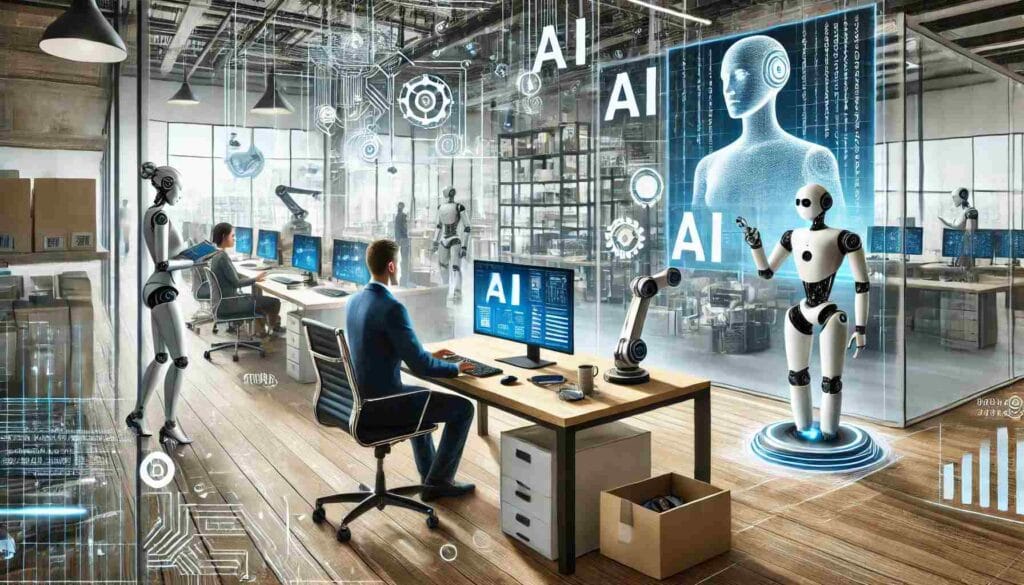The Future of Work: How AI and Automation Will Redefine Careers

In recent years, the world has witnessed rapid advancements in artificial intelligence (AI) and automation, which are reshaping industries, economies, and societies. As we move forward, it is becoming increasingly clear that these technologies will play a pivotal role in how work is performed, what jobs are available, and the nature of careers in the future.
The Rise of AI and Automation in the Workplace
AI and automation are already transforming various sectors, from manufacturing to healthcare, logistics, customer service, and even creative industries. Automation involves the use of machines and software to perform tasks traditionally done by humans. AI, on the other hand, involves systems that can learn, reason, and make decisions, often outperforming humans in specific tasks.
In industries like manufacturing, AI-powered robots can now assemble products faster and with higher precision than human workers. Similarly, in customer service, chatbots and virtual assistants are replacing traditional call centers, providing 24/7 support with minimal human intervention. This trend is only accelerating as businesses seek more efficient ways to meet customer demands and reduce operational costs.
The Impact on Job Roles and Careers
The rise of AI and automation presents both challenges and opportunities. While some jobs may become obsolete, new roles and career paths are emerging. Here’s how the landscape is evolving:
- Job Displacement and Transformation One of the most significant concerns about AI and automation is the displacement of workers. Tasks that were once performed by humans, such as data entry, routine analysis, and basic customer service, are increasingly being automated. This shift may lead to job losses in certain sectors, especially for low-skilled workers who perform repetitive tasks. However, it’s not all doom and gloom. Many jobs will be transformed rather than replaced. For example, AI may assist doctors in diagnosing diseases more accurately, but human doctors will still be needed to interpret results, provide care, and empathize with patients. The key will be for workers to adapt by acquiring new skills that complement AI technologies.
- Emerging Job Roles As AI and automation continue to expand, new roles will emerge in fields like AI development, robotics, data science, and cybersecurity. There will be a growing demand for professionals who can design, maintain, and optimize AI systems. Additionally, industries such as healthcare, education, and entertainment will need experts who can leverage AI to create innovative solutions and services. For example, AI ethicists and machine learning specialists will become increasingly important as AI systems are deployed across various sectors. Professionals will need to address the ethical implications of AI, such as privacy concerns, bias in algorithms, and the impact on employment.
- The Shift to Creative and Cognitive Work While automation can replace many manual and repetitive tasks, there are aspects of work that are less likely to be automated—creativity, problem-solving, and emotional intelligence. Careers in art, design, marketing, and management, which require complex decision-making, human interaction, and creative thinking, will continue to thrive. The future workforce will likely see a shift from routine and manual jobs to roles that require advanced cognitive abilities, empathy, and critical thinking. AI will be used as a tool to enhance human capabilities, enabling workers to focus on higher-value tasks while automation handles the more mundane aspects of work.
Skills for the Future Workforce
In a world where AI and automation play a central role, workers will need to develop a combination of technical and soft skills to stay competitive. Some of the key skills for the future workforce include:
- Technical Skills:
- AI and Machine Learning: Understanding how AI works and how it can be applied to solve real-world problems will be crucial.
- Data Analysis: The ability to analyze and interpret large datasets will be in high demand.
- Programming and Coding: While not everyone needs to be a computer scientist, understanding basic coding concepts will be increasingly valuable.
- Soft Skills:
- Creativity and Innovation: The ability to think outside the box and come up with new ideas will set individuals apart.
- Emotional Intelligence: As automation handles tasks, human workers will be expected to demonstrate empathy, communication, and leadership skills.
- Adaptability: The ability to continuously learn and adapt to new technologies and ways of working will be essential.
The Role of Education and Training
To prepare the workforce for the future, education systems and businesses will need to invest in lifelong learning. Traditional education models may need to be updated to focus more on technical skills and interdisciplinary studies that combine technology with humanities and social sciences.
Online platforms, coding boot camps, and vocational training programs will play a crucial role in reskilling workers and preparing them for new job roles. Governments, companies, and individuals must collaborate to ensure that the workforce is equipped with the skills needed for the evolving job market.
Conclusion: Embracing Change and Shaping the Future
The future of work is undeniably influenced by the rise of AI and automation, but this doesn’t necessarily mean the end of human labor. Instead, it marks the beginning of a new era where technology complements human abilities, creating new opportunities for innovation, creativity, and growth. While the transition may bring challenges, those who adapt and develop the right skills will find themselves at the forefront of an exciting new world of work.
As we look ahead, the key will be to embrace change, invest in continuous learning, and prepare for a future where technology and humanity work together to create a better, more efficient, and more inclusive workforce.
Source : Medium.com




